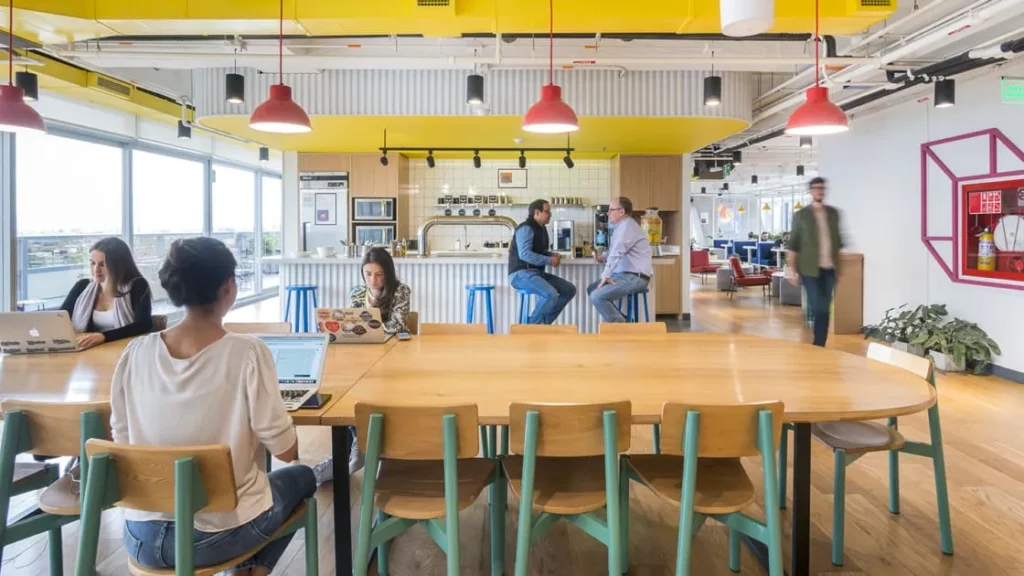· Vimal Hari · Business · 7 min read
The Coworking Revolution: Why Flexible Workspaces Are Replacing Traditional Offices
Discover why coworking spaces are rapidly replacing traditional offices. Explore the benefits of flexibility, cost-effectiveness, community, and innovation that are driving this workplace revolution.

In the past decade, coworking spaces have undergone a meteoric rise, evolving from niche solutions for freelancers and startups to a full-blown revolution that is fundamentally reshaping the corporate landscape. Once viewed as a trendy alternative, coworking spaces are rapidly becoming the preferred choice for businesses of all sizes, from nimble startups to established Fortune 500 companies. This seismic shift isn’t a fleeting trend, but rather a profound reflection of the evolving nature of work, fueled by the growing demands for flexibility, cost-effectiveness, community, and technological advancements.
The global coworking space market is booming. According to a report by Statista, the number of coworking spaces worldwide is projected to reach over 40,000 by 2024, up from just under 20,000 in 2018. In 2022, there were 3.8 million people who worked in co-working spaces. This is projected to rise to 5.1 million by 2026.
As the future of work continues to unfold, a growing number of professionals and businesses are migrating towards these dynamic, collaborative environments. Let’s delve into the compelling reasons behind this mass exodus from traditional offices and why coworking spaces are poised to become the new standard.
1. Flexibility: The Cornerstone of Modern Work
In today’s rapidly changing business environment, agility and flexibility are no longer optional – they’re essential for survival. Traditional office leases, with their rigid terms and long-term commitments, often feel like a relic of the past. Coworking spaces, in stark contrast, offer a breath of fresh air with their flexible membership models.
- Adaptable Agreements: Whether a business requires a handful of desks for a month-long project or a dedicated office suite for a year, coworking spaces can effortlessly accommodate evolving needs.
- Hybrid Work Harmony: The rise of remote work has fundamentally altered the workplace dynamic. Coworking spaces seamlessly support hybrid work models, empowering employees to choose between working from home, the central office, or a conveniently located coworking space. A Buffer survey found that 99% of respondents would choose to work remotely, at least some of the time, for the rest of their careers. This statistic alone should make companies rethink their office spaces.
- Talent Magnet: This unparalleled flexibility is a powerful magnet for attracting and retaining top talent in today’s fiercely competitive job market.
2. Cost-Effectiveness: A Smarter Way to Work
Running a traditional office can be a significant financial burden. Rent, utilities, office equipment, maintenance, and a myriad of other overhead costs can quickly deplete a company’s resources. Coworking spaces present a compellingly cost-effective alternative by providing access to shared resources such as:
- Meeting rooms equipped with state-of-the-art video conferencing technology
- Blazing-fast, reliable internet connectivity
- Professional-grade printing and scanning facilities
- Fully stocked kitchens and break areas
- Cleaning and maintenance services
- Mail and package handling
- Receptionists and admin support
By sharing these amenities, businesses can dramatically reduce their operational expenses.
- Startup Savings: For startups and small businesses, the financial benefits are even more pronounced. Coworking spaces eliminate the need for substantial upfront capital investment in office infrastructure, freeing up valuable resources for growth initiatives and innovation. A study by Harvard Business Review found that employees in coworking spaces thrive more than those in traditional offices, with 83% reporting they felt less lonely.
3. The Power of Community: Collaboration and Connection
One of the most transformative aspects of coworking spaces is the vibrant sense of community they cultivate. Unlike traditional offices, which can often feel isolating and siloed, coworking spaces foster a culture of collaboration, networking, and knowledge-sharing.
- Diverse Ecosystem: Surrounded by a diverse mix of professionals from various industries, coworkers have unparalleled opportunities for cross-pollination of ideas, partnerships, and mentorship.
- Curated Events: Many coworking spaces go the extra mile by hosting a calendar of events, workshops, and networking gatherings designed to facilitate personal and professional growth. This fosters a sense of belonging and support that is rarely found in traditional office settings.
4. Innovation-Friendly Environments: Fueling Creativity
Coworking spaces are meticulously designed to spark creativity and enhance productivity. They often feature modern, aesthetically pleasing environments that are a far cry from the sterile, uninspiring cubicle farms of yesteryear.
- Inspiring Design: With ergonomic furniture, open layouts, natural light, and thoughtfully designed breakout areas, coworking spaces offer a perfect blend of professional yet relaxed atmospheres. A study by Deskmag found that 71% of respondents reported a boost in creativity since joining a coworking space.
- Idea Incubators: Traditional offices, in contrast, can feel rigid and stifle innovation. Coworking spaces promote a free flow of ideas and encourage new ways of thinking, which is particularly beneficial for industries that rely on creativity and out-of-the-box solutions.
5. Cutting-Edge Technology and Infrastructure: Seamless Productivity
Coworking spaces are built to meet the demands of modern businesses, offering top-tier infrastructure that rivals even the most well-equipped corporate headquarters.
- High-Speed Connectivity: From lightning-fast internet to advanced video conferencing rooms and state-of-the-art office equipment, they provide everything a business needs to thrive.
- Plug-and-Play Solutions: With the rise of cloud computing, digital collaboration tools, and remote work technology, coworking spaces are perfectly positioned to support these tools seamlessly. They offer plug-and-play solutions, allowing businesses to set up and get to work without the headaches of IT issues or infrastructure setup.
6. Sustainability: A Greener Way to Work
As environmental consciousness grows, coworking spaces are emerging as a sustainable alternative to traditional offices.
- Reduced Footprint: By sharing resources and optimizing space utilization, coworking offices significantly reduce the overall carbon footprint of each member business. Many coworking spaces also embrace green building practices, such as energy-efficient lighting, waste reduction initiatives, and the use of sustainable materials.
- CSR Alignment: This aligns perfectly with the growing trend of corporate social responsibility (CSR), where businesses are increasingly expected to contribute positively to the environment. By choosing coworking spaces, companies can demonstrate their commitment to sustainability, reduce waste, conserve energy, and promote a greener future.
7. Work-Life Balance and Employee Well-being: Prioritizing People
Today’s employees are seeking more than just a paycheck; they crave a work environment that supports their well-being and promotes a healthy work-life balance. Coworking spaces are often designed with wellness in mind, incorporating features like:
- Abundant natural light
- Comfortable and ergonomic seating
- Quiet zones for focused work
- Wellness programs, such as yoga or meditation sessions
8. Global Accessibility: Expanding Horizons
With a vast network of coworking spaces spanning cities across the globe, businesses with remote teams or international clients can effortlessly maintain a global presence without the expense and complexity of managing multiple office locations.
- Market Expansion: This is especially advantageous for businesses looking to expand into new markets, as they can easily find coworking spaces that cater to their needs in different regions.
- Digital Nomad Support: For freelancers and digital nomads, coworking spaces provide a sense of stability and consistency while traveling. They offer access to professional environments wherever they go, ensuring that work continues smoothly across borders.
9. Adapting to a Post-Pandemic World: Embracing the New Normal
The COVID-19 pandemic served as a catalyst, fundamentally altering how businesses view office spaces. With remote work proving successful for many companies, the necessity of traditional office spaces came into question. However, many employees still yearn for the structure and social interaction that comes with working outside the home.
- The Perfect Compromise: Coworking spaces offer the ideal compromise, providing a safe, professional, and flexible environment without the rigid requirements of traditional offices.
- Scalability: In a post-pandemic world, coworking spaces also offer the flexibility to scale up or down as needed, allowing companies to maintain a dynamic approach to office space in the face of uncertainty.
Conclusion: The Future of Work is Flexible, Collaborative, and Coworking
The shift from traditional offices to coworking spaces is not a mere trend; it’s a profound response to the changing nature of work itself. The compelling benefits of flexibility, cost savings, innovation, community, and sustainability are driving the future of coworking spaces, making them an irresistible solution for businesses of all sizes.
As the lines between work and life continue to blur, and as companies increasingly embrace remote and hybrid work models, coworking spaces are poised to become the new normal. With all the advantages they offer, it’s no surprise that everyone, from solo entrepreneurs to large multinational corporations, is making the move to coworking spaces, leaving the traditional office model behind.
In a world where adaptability is paramount, coworking spaces provide the tools, environment, and community that businesses need to not just survive but thrive in the future of work. The coworking revolution is here, and it’s redefining the way we work, collaborate, and succeed.




